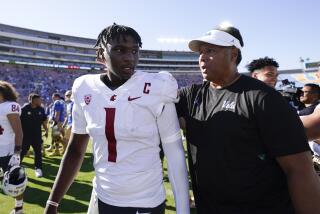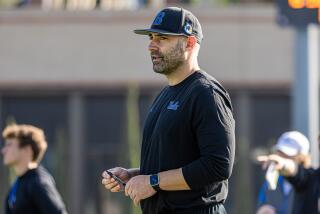Former Naval Officer Welsh Still Likes Sea : Virginia’s Football Coach Wants to Sail Another Ship
CHARLOTTESVILLE, Va. — The two big creases in his brow have sunk a fathom or two over the years, but they still roll like waves toward the blue-gray eyes, the Lincolnesque nose and a thin mouth that doesn’t open for superficial chit-chat.
The professional hats that George Welsh has worn above that brow have numbered only two: naval officer and football coach. There were seven years serving his country on a cruiser and a destroyer. The coaching chores have gone on for 23 years now, and Welsh’s fifth season at Virginia and 14th as a head coach begins here today when the Cavaliers open their season against South Carolina.
Welsh turned 53 last week, but he is still something of an enigma, even to those he thinks know him.
Bob DeStafney, who played at Navy from 1975 to 1977, once said of Welsh: “He’s like the captain of a ship. It’s lonely at the top.”
Eddie Meyers was a running back on Welsh’s last team at Navy. “It takes a long time to understand him,” Meyers said. “I don’t think any of the players can say they know him really well. We call him ‘The Voice in the Wilderness.’ ”
The story at Virginia is similar. Don Majkowski, Virginia’s senior quarterback, said: “There is a certain distance between him and the players, which I think is good. This way nobody can criticize him for having favorites on the team.”
Welsh chuckles and is mildly surprised by the comments. “I think they know that my door is always open,” he said. “I just try not to interfere with their lives too much.”
So who does know him well? Start with his wife, Sandra.
“Yeah, she probably knows me pretty well,” Welsh said. “Some of my assistants have been with me for eight, 10, 12 years, and they probably know me. Though I don’t get to see him that often, I think of Joe Paterno as a friend. But I’ve never felt a need for a lot of close friends.”
Navy Athletic Director J.O. (Bo) Coppedge was a plebe coach when Welsh was a star quarterback for the Midshipmen, leading the nation in passing and total offense while helping the 1955 team win the Sugar Bowl. After seven years of active service in the Navy, and 10 as an assistant at Penn State, Welsh went back to Annapolis as the academy’s head coach for the next nine.
“George is by nature a quiet guy,” Coppedge said. “On the other hand, in friendly groups he is outgoing and he’s interested in lots of things other than football. I’ll say one thing about George, and I mean this as a compliment: He is a great listener.”
Rip Engle was the Penn State coach who gave Welsh, then 29, his first coaching job. Three years later, Paterno took over the Nittany Lions.
“George has always been a guy that smelled of confidence,” said Paterno, who is godfather to the Welshes’ four children. “He was a great, great assistant, and I knew he’d make a great head coach. Once you get to know him, it’s tough not to like him. He very rarely deals in personalities. He is a thoughtful man, a bright man, and he thinks out everything he says.”
George Welsh the coach is different from George Welsh the person, according to George Welsh. “I’ll yell and get excited on the field. I’m not afraid to yell if somebody isn’t doing something right,” he said. “But I think I’m different off the field.”
Joe Spaziani, Virgina’s secondary coach, played for Paterno at Penn State and then served as a graduate assistant under Paterno and Welsh. Spaziani joined Welsh’s Navy staff in 1975 and has been with him since. Linebacker coach Tony Whittlesey joined Welsh’s staff in 1978 and also followed him to Charlottesville. Six of the nine Virginia coaches also were at Annapolis.
“He’s very demanding on the field and wants those demands met, and he generates that with loud encouragement,” Whittlesey said of Welsh. “He’s unpredictable. When you think you understand him, it doesn’t quite happen that way.”
After nine seasons at Navy and four at Virginia, Welsh has a 77-67-3 record and a reputation for being one of the best coaches in the country because of his ability to win despite demands that limit who he can recruit. After an initial 2-9 season, the last three Virginia teams have gone 6-5, 8-2-2, 6-5, and the ’84 team won the Peach Bowl, the school’s first post-season appearance. The last time Virginia had three consecutive winning seasons was 1950-52, and after that it had only two above .500 before Welsh arrived.
He still gets a kick out of coaching, though different phases of the job have different appeals.
“I like being on the field and the Xs and Os part of the job best,” Welsh said. “The public relations and fund raising, I don’t enjoy as much.”
Said Paterno: “George isn’t a glad-hander, and he’s not the kind of guy who’s trying to sell himself.”
But recruiting is a major part of the job. “I try to sell the school and the program,” Welsh said.
When the recruits get to Virginia, they find that discipline is a Welsh trademark. Team rules include an 11 p.m. curfew on Thursdays and no drinking in public. Majkowski violated the second of the two last year and was suspended one game.
“There are just some sacrifices you have to make if you want to play football,” Welsh said. “There aren’t that many rules, but I expect them to be followed. I don’t know whether they had been winked at in the past, but I think they realized I was serious when I suspended Majkowski.”
That episode paled compared with this summer, when three players were charged with conspiracy to distribute cocaine. Tailback Barry Word, who had been the ACC player of the year, and kicker Kenny Stadlin, Virginia’s career kick-scoring leader, had used up their eligibility. Tailback Howard Petty, who had 525 yards rushing in ‘85, had one season remaining. Word has pleaded guilty, while Petty (who has said through his lawyer that he will not contest the charge) and Stadlin are scheduled to appear in U.S. District Court next month. It was a crisis for the school that had won the 1985 College Football Association Academic Achievement Award for graduating 92.6% of its players.
“It was very hard,” Welsh said. “I don’t like to use the word shocked very often because I’m often surprised but I try not to be shocked. But that was a little bit of a shock, I will admit. It hurt and it was painful for a while.”
In a staff meeting after the charges, Welsh said it was suggested that coaches spend more time at home instead of away recruiting.
“I think we’d do a little bit better job with our own squads if we were around more,” Welsh said. “You see them in pre-season and during the season. But once the season ends and recruiting starts, you can go on the road and see kids as of Dec. 1. Then you don’t get back into the office to see them until March 1, when recruiting is more or less over. . . . I think we could do a little better job by keeping head coaches at home, and maybe even assistants.”
Such changes probably would not have prevented what happened, Welsh said.
“You need a good education program, and I think random testing is a deterrent,” he said. “But I think it would be better if we were not on the road so much. Now, you have to pay more attention to the people you’re recruiting--and you lose half of them, anyway--than to the people you already have.”
Welsh grew up in Coaldale, Pa., smack in the middle of coal country. His widowed mother still lives in the town that once had 8,000 to 10,000 people but has far fewer now as a result of the closing of mines. Welsh’s father was an electrician for the Lehigh Navigation Coal Co., and worked mainly above ground.
“I never went down,” Welsh said of the mines, “But a couple of my uncles worked down in the mines. I’d see the black in their eyes and under their fingernails. They never got it out.
More to Read
Go beyond the scoreboard
Get the latest on L.A.'s teams in the daily Sports Report newsletter.
You may occasionally receive promotional content from the Los Angeles Times.










